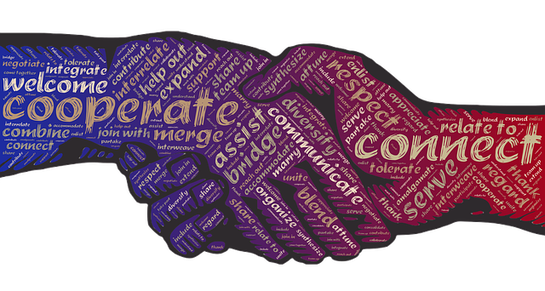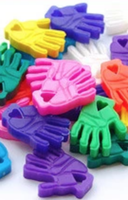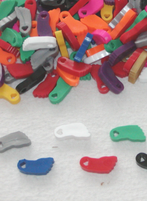|
Submitted by Ellie As a new leader, my year thus far has been full of lessons and memorable experiences that have contributed to my growth as a person and as an adventure leader. One specific lesson I remember was when I facilitated an acid river activity with my class. This was a turning point for me as a leader as it was my first solo facilitation experience. It taught me that things don’t always go as planned but that it is necessary to go with the flow of the activity - it will likely lead to something new and amazing for both the leaders and the participants. The first day of the activity, I tried to control too much of what was happening. I believe the participants learned from the experience, but it didn't fulfilled the potential of the activity. However... ...the second day I learned to let go of the reigns... ..and the participants clearly excelled more under this more relaxed and encouraging setting. This was extremely influential in my process as a leader because it taught me to let go of control and allow the natural flow of things to take over for the benefit of the participants and the leader.
0 Comments
Submitted by Mara Processing Conversation Idea I find that processing/debriefing can be the most important part of the activity because it is the time when participants are able to use what they learned and apply it forward into other aspects of their lives. One processing tool that I have been using and found very effective is meditation or being mindful. It can be used in a number of different ways with a number of different outcomes and this is one reason I find it to be so effective. Meditation (being mindful) is something that has strongly impacted my life and I felt this practice needed to be introduced to our students especially because we are high schoolers. High school is a very important part of our lives as it is the beginning of a very large transition in life. We are about to be adults and independence will likely come with that. I have learned that mindful meditation can be a large step to finding our independence. I have used meditation as a tool for participants to look back on what has happened during the activity. I have asked them to feel emotions when given a scenario that they had been in. I have used meditation to calm a group and clear their heads in order for them to really absorb what is coming next in the debriefing process. I have also used it as a visualization tool to set goals for themselves and let them feel that sensation of accomplishment when it has been completed. I have seen this meditation practice help lots of students step out of their comfort zones. I share things I've seen them accomplished and things that they may want to accomplish. They are in no danger by visualizing themselves doing things that they are scared of and it calms their nerves before moving forward with that goal that may have seemed out of their reach. In a literal sense it can also be used as an example for their desired outcome. I've also used meditation to demonstrate that judgements and preconceived notions of people create a barrier that cannot be overcome, but if they go into meeting someone new with an open and clear mind these things won’t stand in the way. Mindful meditation is a very flexible and effective tool for debriefing and I encourage leaders to find new ways to apply it in their program! The biggest lesson I have learned over the last three years of being a leader is that empathy is a leader's superpower. Mara My Greatest Lesson so far, as a Young Team Builder
It is easy to walk into a team building program as a participant and feel uncomfortable and inferior. This is very likely to happen if the leaders contribute to this attitude. At the beginning of my leading experience I would fall into the trap of making people feel inferior. It wasn’t intentional, but because of my initial discomfort I would resort to remembering that I was “in charge”. While being a leader does mean that you are facilitating activities, you are also a part of the group. You are meant to be a part of that growth not just in charge of it. I found that this was very important to distinguish between because they bring very different outcomes. Walking into a group of people it is so important to make that first impression meaningful. Empathy is that key. Acknowledging that you both are coming into a new group of people is the first and most basic example of this. Moving forward it is so important to create those connections with people through empathy. It is important to remember that empathy is not feeling bad for someone but rather putting yourself in their shoes. I think that empathy can be highlighted in so many different scenarios while being a leader. It is important to use while people are out of their comfort zone. Being able to relate and put yourself in other people's shoes creates a sense of trust between people when acted on. Empathy allows people to let their guard down slightly because they know that they are not being judged but rather understood. It is so easy to talk about empathy being important in a leadership role but it is important to carry it out as well. We talk about it so often but it is not always brought into leadership. Maybe it was just me but I fell into a trap that has a very fine line and when that line was made clear to me I was able to connect with people more genuinely. Submitted by Kaia Happiness is like a butterfly which, when pursued, is always beyond our grasp, but if you will sit down quietly, may alight upon you. Nathaniel Hawthorne Oftentimes an individual will get sucked into their own idea of what actual success and accomplishment means. That an accomplishment is only “authentic” if it was done through the blood, sweat, and tears of their own work. If someone else were to help them out, it couldn’t have meant that the accomplishment was “real.”
The quote above, by the nineteenth century novelist Nathaniel Hawthorne, talks about happiness, but its concept can also be applied to reaching our goals. Chasing our idea of happiness may never allow us to be happy. But if we slow down and realize the beauty around us already, then we may find true happiness. This concept of realizing what is around us can definitely help when we try to tackle our own challenges. Once we slow down and reach out for help, our challenges become easier to accomplish. The quote can also be particularly effective after facilitating the Challenge Wall. This is an activity in which the team aims to get their members up a 12ft or 14ft Wall without the use of any platforms, ropes or holds on the wall. It is not possible for a person to get to the top on their own, they need the support of their team. The Challenge Wall, in this situation, can represent some of our own personal challenges. They are huge and out of our reach to accomplish alone. We can try as we may, but we are never going to get up the Wall, and we will just tire ourselves out by trying. We may even give up. If only we were to look around us and realize that there is a community ready to help and support us. When we finally reach out for their help, the challenge has not become smaller -- the Wall did not shrink -- but with the help of our team, we can find, not only success, but a supportive community as well. The mental block associated with reaching out for help is real. For this facilitation to be effective, this mental block needs to be addressed. The quote is a good gateway for this discussion to take place. Hopefully, the individual can come to learn their importance within the community and how they can come to rely on their team to help them work through their challenges. Submitted by Gabby ...we are all in this fight together... My Greatest Lesson so far has come from Cross the Line. Our class felt really disconnected and I could feel the energy of fake relationships and cliques. I wasn’t the biggest fan of the vibe that our class was putting out. It felt like an illusion of belonging - when the bell rings everyone just goes back to their own little corners of the world. What I love most about Cross the Line is that it gives participants the opportunity to be vulnerable and recognize that they are not alone. It gives the participants a taste of what it feels like to explore other corners and it helps them realize that we are all in this fight together and that the cliques and separateness doesn’t stop our war with the world. This class, where we can be as one instead, gives us allies and support. This activity also helps participants see that we leaders (their schoolmates) are just like they are and that we are here for each other.
The use of 'Stories' is one of my favorite tools. During the Cross the Line activity we use The Story of Kyle by David Mikkelson. Briefly, this story discusses how a seemingly tiny act of kindness saves someone’s life.
Particularly in the Cross the Line activity, it feels intimidating to share, so I love the use of a story because it can give someone a connection to the others without having to share themselves. The story cannot only serve as a voice for the voiceless of the group but it can also make a lighter metaphor relate to the bigger picture. (Children’s picture books are particularly good for this as they usually have softer ways of describing bigger scarier issues.) Submitted by Jennifer "I think people generally have a good heart and good intentions to help"* Unknown Being a younger leader among my high-school peer community has presented its challenges, and ups and downs. I have had lessons go haywire and lessons go seamlessly. 'My Greatest Lesson' came from leading a group of individuals as part of our districts' Joliet Program. (For reference, the Joliet program is offered as an alternative support program for students with extreme emotional needs.) My course director made the objectives clear: set challenges and accomplish goals. During this time, as a leader, I had been struggling to navigate the vagueness of what my evaluators considered to be well-rounded facilitation. I was caught up in the nuts and bolts of what specific steps I should be taking to reach the objectives. Prior to the kids coming to our challenge course, our entire high school peer-leader team was given a refresher on how to navigate an emotional rescue with a participant and what mind set we should be coming in with in relation to this audience. I was 'out of my mind' nervous. Not only was this my first time working with a set of individuals who would need my extra support, it was also my first time facilitating outside my high school's peer leadership class, which I wasn't even half way completed with at the time. Walking in that day, my personal objective was to make sure my group wouldn't completely fall apart in the span of five minutes. Little did I know there was a lot more ahead. I was placed with my group engrossed in nerves and fearing for the worst. I quietly asked their names and we went around quickly till there was silence. My group was just looking at me and I was just looking at them in complete silence. One boy spoke up asking whether or not we were going to climb all the way to the top (the top of our challenge course that is). I said back to him, "do you think you can" and I, for the first time in my leadership career, presented a challenge. He, and the rest of the group, looked at me with combined looks of anxiety and excitement. Our peer-leader team's objective came clear to me after presenting that first challenge. I knew I wanted this silent, excited group of individuals to leave the course gaining something. This, as any exploring individual knows, can only be done through reaching your goals and a sense of achievement. I went around to each member of my group and first asked what they wanted to do that day. Most said that they wanted to climb to the very top. I would consider this the overall dream goal. It is fundamentally what a person wants to do. Later that day, after we had taught them some technical skills, I went around to each person in my group and asked them what they were 1000 percent confident that they could actually do. This is the confidence goal. Once they can reach this goal they will have built a good foundation centered in confidence by reaching this baseline. It was then my challenge as a leader to help them find their "actual goal", the middle ground between the dream and the confidence. For example, in the context of education, I know I can get an A on this test, my dream is to get all "A"s, my actual goal is to bring up my grade in this particular class to an A. This is my overall lesson as well. As a student leader, I want to discover how to gain a sense of achievement. Affirmation, in any form, is a mountain mover to an individual or a group. It can change a terrible situation into a great one, but the struggle is finding out how to do it. I still struggle with the vagueness of what it means to be a "good" peer leader and I probably always will, but following that day and following my first facilitation, I have now figured out how to be an effective peer leader. For me, the key is in the three layers of goal setting: dream, confidence, goal. This is not always explicit but with that lesson in mind I am able to create an unmatched group atmosphere. Thanks for 'listening' - Jennifer *I used the quote above as a foundation for a few of my lessons because ultimately, I believe that a student leader's job is to create people who have good hearts and think beyond themselves. We are the examples for others to follow and we set the agenda. We must be good at heart and have the best intentions in mind for our group.
Submitted by Annisa, a high school sophomore. An example of how I have used this debrief anchor tool is in a group initiative we call Maui Kauai. The students are presented with 3 different sized boards and 3 different sized platforms. The implied challenge is for them to get their entire team onto the last platform with the help of only each other and the boards. In this group initiative, the hand and feet anchor tool are perfect for a debrief because the team needs to work together to physically and emotionally help each other across the different platforms.
When using the hands and feet to debrief, I ask the students to pick a person who gave them a helping hand (hands) or who helped ground them during the activity (feet) and exchange hands/feet with them. Then they would be able to keep their hand or foot that they received from another person in the class to help remember their achievement of completing the challenge and the teamwork that they used during the activity itself. Photo by Miha Rekar This post is submitted by Frances, a high school senior and team builder. The one thing that absolutely marked the curve in my growth as a facilitator so far was realizing how important it is to be able to adapt to your group and allow the facilitation to take the path that will be most beneficial for them, even if that is not your intended outcome. I think that a good facilitator merely guides the group and allows the participants to come to their own conclusions. While the facilitator is obviously structuring the way the activity flows,
I’ve found that my ability to promote growth while not forcing a fixed outcome upon the group is vital to the strength of the outcome of the activity. Of course, having an outcome in mind and being properly planned when facilitating an activity is crucial. However, you never know where your group will take an activity, and if it’s in the complete opposite direction from your original intent, I think that it’s more beneficial to allow them to groove with the outcome they naturally pull from the activity. As a facilitator, I need to be prepared to foster that conversation and not be stuck in the mindset that my intended outcome is the only correct debrief to have. For me, finding the confidence to pull questions from what happened during the activity or what’s been said in the debrief instead of reading prepared questions off a sheet in my hand was one of the hardest things I’ve had to learn as a facilitator. I really think it just came with experience and failing forward in the past, but now it’s the lesson that I feel has advanced me the most as a facilitator, and one of the learning opportunities I’ve been most thankful for. Photo by Michael Weidner This post is submitted by Annisa, a high school sophomore and peer team builder. My greatest lesson as a young team builder, that I have learned so far, has been learning to go with the flow and being confident even when my facilitation and/or plans do not go exactly how I want them to. In the beginning of my time facilitating, I only felt confident in briefing and debriefing activities when I had a very well-organized plan and my entire peer leader team knew exactly what was going to happen during a class period.
An experience that really tested this, and shook my confidence, happened early on in our semester. We had planned to pull another leader’s car and debrief and talk about the importance of effort in our Adventure class. Unfortunately, the leader whose car we were planning on pulling was late to class, which meant that we had to re-plan the entire class period within the 7 minutes of passing period we had before the class started. For someone who needs to be planned, this was extremely stressful for me because I felt very unprepared being a new leader who was not very used to facilitating to begin with. During the class, my co-leaders and I 'pulled' together very well as a team and we were able to have a very successful experience even though most of it was unplanned. This unexpected situation challenged not only my need to be organized, but also my confidence. The lesson that I learned from this very stressful situation was that even when things don’t go according to plan, you can still be confident and facilitate through it. I think that I have used this new-found confidence daily in my Adventure class because each and every day things go wrong and things don’t go entirely according to plan. Now, I am ready and confident when I need to improvise during a facilitation. Photo by Alberto Gasco This post is submitted by the team builder Kaia, a high school junior.
We would love to explore some thoughts (answers) for these questions - jump into the Comments and let us know what you think. (Leave answers by number - Thanks.) My Lessons So Far About Building Community Every person is unique. These differences set us apart from one another. But through my experience as a young team builder, even with the most diverse group of people, we can create a community. On the first day of class, not many know each other. Their walls are built up to protect them from the unknown. Whether subconscious or not, everyone wears a mask over their personality and places assumptions/judgements on others. Though this is done to protect ourselves, it creates divides amongst the community. But in team-oriented programs, these divides are addressed and overcome. Over time, through trust and problem solving activities, their walls start to come down. In this safe community, they can be vulnerable with one another. It's a beautiful moment when someone expresses their authentic self. It happens at different times for every student. Some are more comfortable than others showing their inner colors. When they do, even though we express ourselves differently, we get to see how strikingly similar we all are to one another. However, there is something uniquely special about this: the community embraces them for who they are. The people who we categorized as 'too uptight,' 'too opinionated,' 'too annoying,' 'too talkative,' 'too quiet' start to become someone who we can relate to. We can start to empathize with them, and then the most unlikely friendships and connections form. Being a team leader has taught me many things. But the most profound was that a tight community can form no matter how different the individuals seem to be. Love to hear from you - leave us a Comment.
Also, when a caterpillar becomes a butterfly it develops new abilities which can be used to symbolize a new skill or lesson a class learns after an activity. This prop can be used to debrief any activity that has to do with growth. For example, using this prop with Charlotte's Web [Spider Web] works well, because after students finish this activity they often feel extremely accomplished - they've grown as a class.
How do you balance your strengths? How would you (do you) use the Caterpillar prop? Leave us a Comment - we'd love to hear from you! |
AuthorsYoung team Builders are high school and college age students working in team building settings around the world, contributing to this space, sharing what they're creating, programming, teaching and learning. See FUNdoing for team building activities and other resources for team builders.
Find theoretical posts on team building topics, as well as the 'Ask Michelle & Chris About Team Buidling' and the 'OnTeam Building' podcasts.
Archives
August 2021
|
||||||||












 RSS Feed
RSS Feed